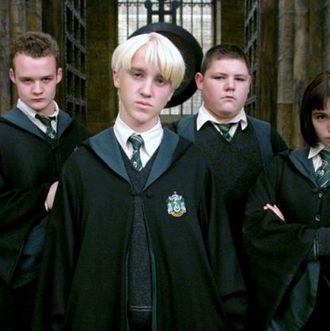
It is a horrendous coincidence of timing for Mitt Romney that the day after President Obama ceased his elaborate wink-and-nod game and endorsed gay marriage, Jason Horowitz reports that Romney bullied a gay classmate at his prep school. The juxtaposition presents an especially unfortunate contrast, and an unfair one as well — here is the adolescent Romney, operating under the social mores of the sixties, against an adult Obama acting in a world in which the gay-rights cause has largely prevailed. But does it tell us anything about Romney’s character?
It is tricky business to extrapolate from a teenager’s behavior to conclusions about his makeup as an adult. Some of us become radically different people as we grow up, and others — as is often on display at a high-school reunion — simply become older versions of their teenage selves. Lanny Davis, who knew George W. Bush in college, offered this recollection in 2005 of the future president, which contrasts sharply with Romney’s mentality:
A few of us were in the common room one night. It was 1965, I believe — my junior year, his sophomore. We were making our usual sarcastic commentaries on those who walked by us. A little nasty perhaps, but always with a touch of humor. On this occasion, however, someone we all believed to be gay walked by, although the word we used in those days was “queer.” Someone, I’m sorry to say, snidely used that word as he walked by.
George heard it and, most uncharacteristically, snapped: “Shut up.” Then he said, in words I can remember almost verbatim: “Why don’t you try walking in his shoes for a while and see how it feels before you make a comment like that?”
Bush’s natural compassionate instincts did not make him a good president, or unwilling to cater to anti-gay sentiment for political advantage.
The best way to assess a candidate is not to plumb his youth for clues to his character but to look at his positions and public record. The problem is that this is a harder exercise with Romney than almost any other national politician. He has had to run in such divergent atmospheres, and has thus had to present himself in such wildly different ways at different times, that his record becomes almost useless. There is hardly a stance Romney has taken that he has not negated at one point or another. This makes the fraught task of trying to pin down his true character more urgent, though not any easier.
My cautious, provisional take is that this portrait of the youthful Romney does suggest a man who grew up taking for granted the comforts of wealth and prestige. I don’t blame him for accepting the anti-gay assumptions of his era. The story does give the sense of a man who lacks a natural sense of compassion for the weak. His prankery seems to have invariably singled out the vulnerable — the gay classmate, the nearly blind teacher, the nervous day student racing back to campus. It’s entirely possible to grow out of that youthful mentality — to learn to step out of your own perspective, to develop an appreciation for the difficulties faced by those not born with Romney’s many blessings. I’m just not sure he ever has.






























